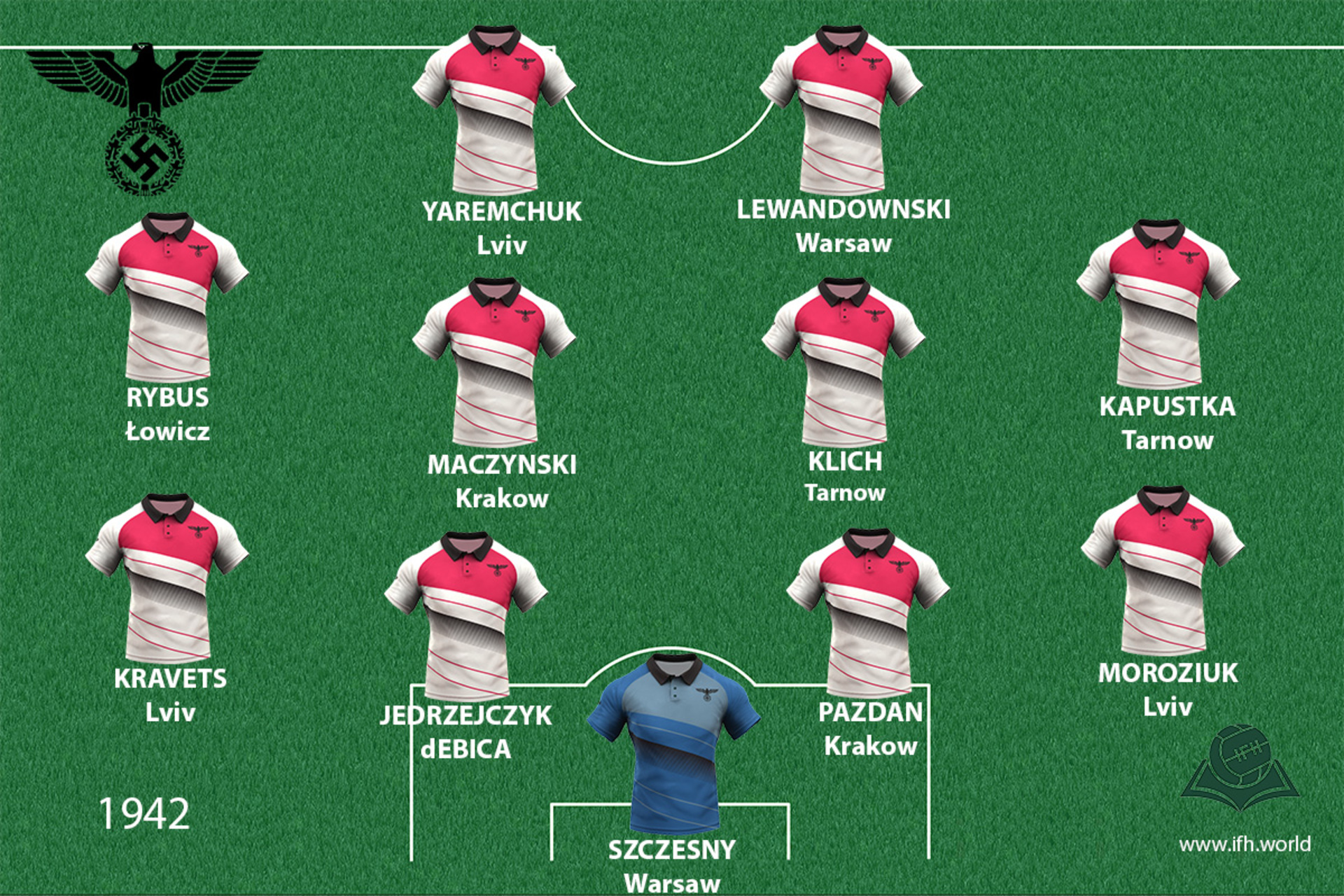General Government
General Government (GG) was a zone of German occupation carved out of the Second Polish Republic. Occupied Poland was turned into an experimental area for repressive and utopian population policies: the Lebensraum and the Holocaust.

Coat of arms
Shirt
| Position | First name | Last name | Mjesto rođenja | Like | Dislike |
|---|
(Today: central and southern Poland, parts of western Ukraine)
After 1939. Nazi regime annexed the western territories of prewar Republic of Poland to the Reich and from the central and eastern teritories, with Warsaw, they created the General Government (GG). The latter was administered by a German General-Governor. The name ''Poland'' was banned.[1]
From 1939 a Polish underground, one of the largest in occupied Europe, resisted the Nazis through a veritable secret state and an Armia Krajowa loyal to the Polish government-in-exile.[2] Those willing and ready to fight the German occupier possibly made up one-quarter of the population. During the war the Polish underground press was increasingly fond of taking credit for the fact that there was no homegrown collaborator of Vidkun Quisling or Emil Hacha.[3] Other side of medal says that, according to Nazi German plans, the Polish nation was to become extinct. Because of a lack of interest on the part of the Nazi leadership, there was no basis for state collaboration. On the contrary, overtures even by Polish fascists and other staunch anti-Semites were rebuffed by the occupiers.[4]
One the other hand, although the vast majority of the prewar citizenry collaborating with the Nazis came from the Volksdeutche, there were alo the bulk of the Poles cooperated and collaborated with the Germans as much as survival in the abnormal life of occupation required or allowed.[5]
Policies in the annexed territories and the GG differed. In the western Polish territories that had been annexed to the Reich, Polish state authority was abolished entirely. At the lower administrative level in the GG, however, the occupiers were dependent on Polish cooperation for their social, educational, and cultural policies.[6]
The Nazi imperial project of the “Third Empire” looked to internal colonization of the European continent, articulated in Hitler’s vision of Lebensraum for German Volk in the European “East.” Polish were part of it. The Governor of the GG, Hans Frank, was quick to declare the GG as “the first colonial territory of the German nation.” The Lebensraum of the European “East” found inspiration in the “Manifest Destiny” of the United States from the 19th century. Hitler and Hans Frank both saw a kind of Indian or Native American in the Poles and some even called GG as the “heart of the German ‘Wild East’”.[7] In Nazi ideology the Slavs are a mass of born slaves, who feel the need of a master. For them, the Poles (much like American natives) are not a state-building nation and that they lack even the most elementary preconditions for it. Also, A country which has so little feeling for systematic settlement, that is not even up to dealing with the style of a village, has no claim to any sort of independent political status within the European area.[8]
Considering that “one in every three victims of the Holocaust was murdered in the GG, more than anywhere else in Europe,” that it became the locus of the death camps (Auschwitz-Birkeanu, Treblika, Majdanek etc) and the Warsaw Ghetto, the General Government arguably represents the ground zero of the Holocaust, odnosno sustavnog istrebljenja Židova.[9]
In general, the Holocaust was much more than a ethnic cleansing because the Nazis were actively searching for Jews even in the countries where Germans never lived or intended to live. The Nazis had a program of racial, national and political purity of the Third Reich without the separation of legislative, executive and judicial power, and therefore the Holocaust and concentration camps represented its inner necessity of existence. [10]
In the GG the murder of the Jews was carried out with a measure of cruelty that the non-Jewish population could not help noticing in everyday life. In view of the persecution of the Jews, most of Poles adopted a policy of ''wait-and see''. Anti-Semitism has a long traditions among the local Christian population. Althought, the attitude of the church hierarchy towards the occupying regime was not uniform, the clergy made little effort to enlighten rural dwellers wont to regard Nazi destruction of Jewish communities as punishment for the crucifixion of Christ and a lack of religiousness among them. In their sermons the Catholic hierarchy in the GG did not find words to denounce the murder of the Jews.[11]
- [1] ''The Dark Heart of Hitler’s Europe: Nazi Rule in Poland Under the General Government'', http://cosmopolitanreview.com/the-dark-heart-of-hitlers-europe/
- [2] ''Poland. The Second Republic'',https://www.britannica.com/place/Poland/The-Second-Republic#ref397027
- [3] Klaus-Peter Friedrich, Collaboration in a "Land without a Quisling": Patterns of Cooperation with the Nazi German Occupation Regime in Poland during World War II, Slavic Review, Vol. 64, No. 4 (Winter, 2005), pp. 719
- [4] Klaus-Peter Friedrich, Collaboration in a "Land without a Quisling": Patterns of Cooperation with the Nazi German Occupation Regime in Poland during World War II, Slavic Review, Vol. 64, No. 4 (Winter, 2005), pp. 717
- [5] Klaus-Peter Friedrich, Collaboration in a "Land without a Quisling": Patterns of Cooperation with the Nazi German Occupation Regime in Poland during World War II, Slavic Review, Vol. 64, No. 4 (Winter, 2005), pp. 744
- [6] Klaus-Peter Friedrich, Collaboration in a "Land without a Quisling": Patterns of Cooperation with the Nazi German Occupation Regime in Poland during World War II, Slavic Review, Vol. 64, No. 4 (Winter, 2005), pp. 716, 733
- [7] ''The Dark Heart of Hitler’s Europe: Nazi Rule in Poland Under the General Government'', http://cosmopolitanreview.com/the-dark-heart-of-hitlers-europe/
- [8] JURGEN ZIMMERER, The birth of the Ostland out of the spirit of colonialism: a postcolonial perspective on the Nazi policy of conquest and extermination, Patterns of Prejudice, Vol. 39, No. 2, 2005.,205
- [9] ''The Dark Heart of Hitler’s Europe: Nazi Rule in Poland Under the General Government'', http://cosmopolitanreview.com/the-dark-heart-of-hitlers-europe/
- [10] ''Preboljevanje zla'', http://www.tacno.net/novosti/prebolijevanje-zla/
- [11] Klaus-Peter Friedrich, Collaboration in a "Land without a Quisling": Patterns of Cooperation with the Nazi German Occupation Regime in Poland during World War II, Slavic Review, Vol. 64, No. 4 (Winter, 2005), pp.735, 738
Sources
- Klaus-Peter Friedrich, Collaboration in a "Land without a Quisling": Patterns of Cooperation with the Nazi German Occupation Regime in Poland during World War II, Slavic Review, Vol. 64, No. 4 (Winter, 2005), pp. 711-746
- JURGEN ZIMMERER, The birth of the Ostland out of the spirit of colonialism: a postcolonial perspective on the Nazi policy of conquest and extermination, Patterns of Prejudice, Vol. 39, No. 2, 2005.
- Tihomir Cipek, predavanje na kolegiju ''Politička propaganda u totalitarnim režimima'' (Poslijediplomski sveučilišni doktorski studij „Politologija“), Fakultet političkih znanosti, Zagreb, 18.11. 2013.
- ''Poland. The Second Republic'',https://www.britannica.com/place/Poland/The-Second-Republic#ref397027
- ''Preboljevanje zla'', http://www.tacno.net/novosti/prebolijevanje-zla/
- ''The Dark Heart of Hitler’s Europe: Nazi Rule in Poland Under the General Government'', http://cosmopolitanreview.com/the-dark-heart-of-hitlers-europe/
